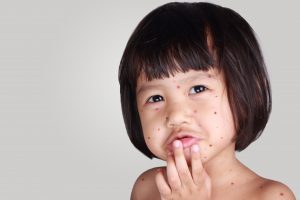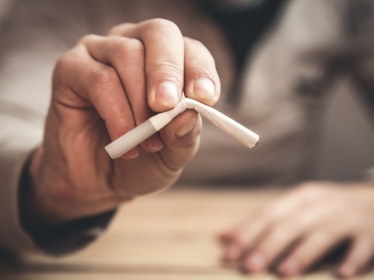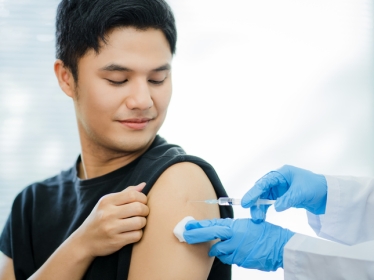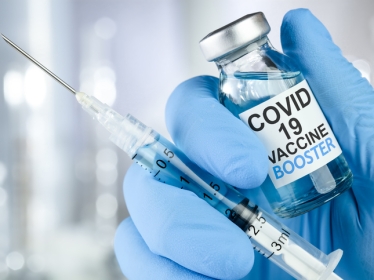What is Chickenpox?
Chickenpox is a highly contagious infection caused by the varicella-zoster virus. It causes a blister-like rash over mainly body and face, before spreading to the rest of the body. It is most serious in very young baby, the elderly, and people with a weakened immune system. The disease can also cause serious infection in new-borns whose mother have had chickenpox around the time of delivery.
Transmission is mainly airborne (through droplets when coughing or sneezing) and less often by direct contact with the fluid of the chickenpox lesions.
Incubation ranges from 7-21 days after exposure.
A person with chickenpox is contagious from 1 to 2 days before rash onset until all the chickenpox lesions have crusted (scabbed).
Signs and Symptoms of Chickenpox
The patient will start to develop a blister-like rash that has a clear fluid, before breaking up and drying. It usually affects the face, scalp and body with relative sparing of the limbs, and is itchy. Typically we can find the rash in different stages of evolution (red spots, vesicles, excoriation, scabs) at the same time.
Vaccinated people who get chickenpox may develop lesions that do not crust. These people are considered contagious until no new lesions have appeared for 24 hours.
Other signs and symptoms include:
- Fever. This may start 1 to 2 days before the rash appears and lasts for 4 to 5 days. It usually abates once the rash has completely appeared.
- Tiredness
- Loss of appetite
- Headache
- Mouth ulcers
Treatment of Chickenpox
Management usually involves reducing fever, discomfort, itch and prevention of dehydration and secondary bacterial skin infection. Fever and anti-itch medicine with adequate oral fluid and proper care of the rash is usually sufficient for mild disease. Aspirin should be avoided to prevent Reye's syndrome (liver and brain damage). There are also antiviral medications that can be used to treat chickenpox. These are usually given within 72 hours of developing the illness, but are most effective when taken within the first 24 hours. This helps to reduce the severity and duration of the disease, as well as reduce the likelihood of complications. This is especially so in those with severe illness or weakened immunity.
Prevention of Chickenpox (Vaccination)
Chickenpox vaccination is administered in 2 doses of vaccines at least 3 months apart.
The Singapore National Immunisation Programme recommends the first dose to be given at 12 months of age and the 2nd dose 3 to 6 months later. This will provide protection in over 90% of the children.
The chickenpox vaccine is very safe and effective at preventing the disease. Most people who get the vaccine will not get chickenpox. If a vaccinated person does get chickenpox, the symptoms are usually milder (fewer vesicles, mild or no fever) and the risk of complications are much less.
In the event that your unvaccinated child is exposed to another person having chickenpox, they can still be vaccinated. The vaccine is still effective if given within 24 to 72 hours of exposure, and will reduce the chance of getting the disease.
What can happen if you do not vaccinate your child?
Chickenpox is highly contagious with an attack rate of 90%. This means that there is a 90% chance of getting the disease if you have been exposed to it (at home or at school for example).
Most healthy children recover uneventfully within 1 to 2 weeks. However, the most common sequela is scarring after the rash has healed. This can be unsightly if the scarring is on the face.
However, complications may occur, especially in those with weakened immunity (patients with cancer, on chemotherapy or steroid therapy):
- Bacterial skin infection - red, warm and painful lesions
- Chest infection (pneumonia) - cough, difficulty in breathing
- Brain infection (encephalitis) - irritability, drowsiness, confusion, severe headache
- Dehydration from reduced oral fluid intake - lethargy, decrease urine output.
- Chickenpox can be serious and can lead to severe complications and death, even in healthy children.
There is no way to tell in advance how severe your child's symptoms will be. The best way to protect your child against chickenpox is to get them vaccinated.
Can my child still get chickenpox even if they were vaccinated? Should I see a doctor if they do?
Efficacy of vaccine is over 90% after the child has completed the 2 doses. If you suspect that your child may have chickenpox despite being vaccinated, you should bring your child to see a doctor to confirm this. This is to make sure that there are no complications and the rash is not due to any other serious conditions. You may book an appointment with Dr Wong at SBCC Baby & Child Clinic (Tiong Bahru) or visit any of our Baby Bonus Approved clinics.






